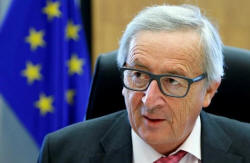|
Docking EU funds not the
only way to ensure member state compliance: Juncker
 Send a link to a friend
Send a link to a friend
 [June 01, 2017]
By Michael Nienaber and Thomas Escritt [June 01, 2017]
By Michael Nienaber and Thomas Escritt
BERLIN
(Reuters) - European Commission President Jean-Claude Juncker said on
Thursday he was against a German proposal to link future EU funds to the
condition that member states stick to rule of law principles.
With the EU debating reform of the bloc after Britain leaves it,
Germany's government has set out proposals to freeze access to EU funds
for countries that fail to meet the EU's rule of law standards,
according to a document seen by Reuters.
Asked during a Europe conference in Berlin if he backed the German
proposal, Juncker said: "I'm of the opinion that one should not do
that."
Such a procedure would be "poison for the continent", Juncker said,
adding that the European Commission had other ways to make clear that
solidarity was not a one-way street.
He also said that the most urgent task currently facing the EU was
completing the jointly agreed capital market and banking union by 2019
and that deepening euro zone cooperation should come later.

"I think we should not focus excessively now on deepening the monetary
union," Juncker said, adding that proposals presented by the European
Commission on Wednesday for a joint budget and a joint finance minister
of the euro zone were mainly meant to start a discussion.
Before creating new institutions and new roles, the EU member states
would have to agree on their exact tasks, he said. "You can't just put a
finance minister out there out of the blue, you also have to clarify
what he should do," Juncker said.
Juncker repeated that Europe had to make clear to the United States that
quitting the Paris climate agreement was not a straightforward process,
adding that fully leaving the deal would take three to four years.
U.S. President Donald Trump is expected to announce on Thursday his
decision whether to keep the United States in the global pact to fight
climate change, as a source close to the matter said he was preparing to
pull out of the Paris accord.
[to top of second column] |

European Commission President Jean-Claude Juncker chairs a meeting
of the EU executive body in Brussels, Belgium May 10, 2017.
REUTERS/Francois Lenoir

Juncker said the European Union would have to take the lead role in fighting
climate change together with other allies if the United States pulled out.
"We then would have to try to find common ground with the Chinese," Juncker
said.
Speaking at the same event, Germany's center-left candidate for chancellor
Martin Schulz said that if Trump quit the climate pact, U.S. producers would
gain a competitive advantage over their European rivals. The EU would have to
respond to market distortions of this kind, he added.
"If Mr Trump wants to leave the climate pact, then we must talk openly about
trade relations and market distortions," Schulz said, suggesting that
backsliding on environmental standards could harm U.S. access to the world's
largest market.
Schulz is the center-left Social Democratic Party's candidate to succeed
Chancellor Angela Merkel in September elections. His party is currently running
second in polls behind Merkel's Christian Democrats.
(Reporting by Michael Nienaber and Thomas Escritt; Editing by Catherine Evans)
[© 2017 Thomson Reuters. All rights
reserved.] Copyright 2017 Reuters. All rights reserved. This material may not be published,
broadcast, rewritten or redistributed.

 |